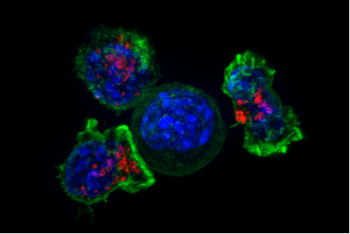Diseases and disorders plague humanity. They have the power to devastate the afflicted and those close to them. Globally researcher are fighting back. Recently, the Maltese branch of this international force came together at the 9th Malta Medical School Conference to present their most recent findings on matters from pediatrics and public health, to the minute mechanics of the molecular world that make us all tick. Outlined here are just two examples out of over a hundred presented on the day. Words by Scott Wilcockson.
What better way to combat disease than to use your own inbuilt army of cellular sentinels? Immunotherapy is a hot topic. Its goal is to use a patient’s own immune system to attack cancer cells. One problem is that cancer cells are able to influence a particular type of immune cell, known as regulatory T cells. These cells repress the immune system, keeping it in check and preventing autoimmune diseases like arthritis and diabetes. Cancer cells take advantage of this and are able to effectively protect themselves from immunological attack. Research carried out by Oriana Mazzitelli and colleagues (Faculty of Medicine and Surgery, University of Malta) aims to alter the activity of these immune cells in order to improve cancer immunotherapeutics, which are new classes of drugs that might help stop cancer.
Similar efforts in the past to tweak the immune system in the treatment of cancer have shown promising results in mice. Mazzitelli is extending this to humans with positive early results. By exposing these cells to bacterial proteins or cancer cell DNA, it is possible to turn off, or on, genes that control regulatory T cell activity. The next step is to directly convert these cells into cancer killers to stop or reverse the disease using immunotherapy. This study represents just one of the many aimed at understanding cancer biology and developing therapeutics in Malta and worldwide.

Another major focus of study is the general health of the Maltese population. Dr Miriam Gatt and Dr Kathleen England (Directorate of Health Information and Research, Malta) have carried out research on newborn deaths in Malta. The two major causes of infant death are congenital anomalies like defects when a fetus is developing and non-congenital anomalies like premature births.
The situation is double-edged. Overall newborn mortality in Malta decreased between 1994 and 2013 because of reductions in non-congenital anomalies. On the other hand, the rate of death by congenital anomalies, such as heart and nervous system defects, have remained steady and Malta was recently identified as having the highest rate of neonatal mortality in Western Europe (4.2 deaths per 1000, compared to a European average of 2.2 per 1000). One contributing factor is the current legislation on abortion that leads to the high death rate. To bring these figures down the research suggests using treatments like folic acid supplementation when planning a child.
The fight against disease continues. University of Malta researchers and medics maintain the advance, probing the fundamentals of disease and forging new weapons to push back the tide of malevolent maladies in Malta, and the world.
This article featured in the Sunday Times of Malta.





Comments are closed for this article!